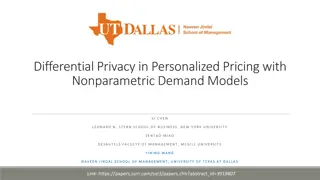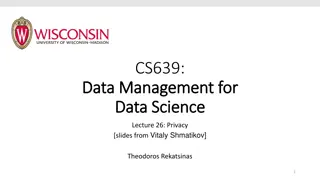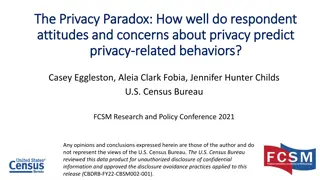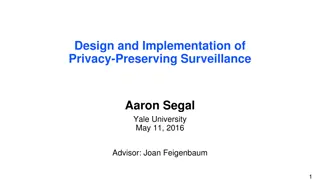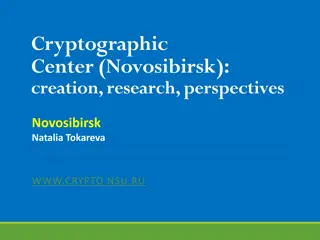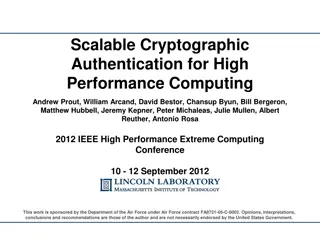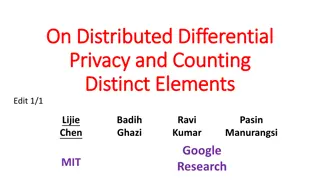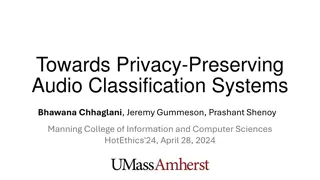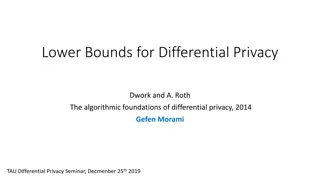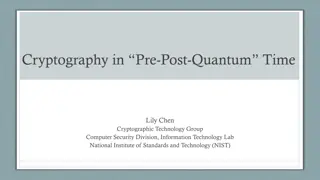Cryptographic Reductions and Learning in Computational Complexity
This lecture explores the connection between computational complexity and cryptography, focusing on topics like pseudorandom functions, public-key cryptography, and learning from Gaussians. It delves into the implications of cryptographic reductions, lower bounds for learning MLPs, and the existence
3 views • 22 slides
Dynamic Pricing Algorithms with Privacy Preservation in Personalized Decision Making
Explore the challenges of preserving privacy in dynamic personalized pricing algorithms for decision-making in business. The research focuses on nonparametric demand models and differential privacy to safeguard user data against various privacy attacks, addressing the growing concerns and the need f
9 views • 30 slides
Cryptographic Data Integrity Algorithms
Cryptographic data integrity algorithms ensure data integrity, verifying data received matches what was sent by authorized entities. Cryptographic hash functions play a crucial role in ensuring data integrity through hash values. Applications include message authentication, digital signatures, and v
7 views • 41 slides
Privacy in Information Security Training
Privacy awareness training is crucial, covering topics such as the definition of privacy, importance of privacy protection, Personally Identifiable Information (PII), and Sensitive PII. Discover why privacy is vital to maintaining public trust, preventing identity theft, and complying with laws. Lea
2 views • 55 slides
NCVHS Subcommittee on Privacy Comments on HIPAA Privacy Rule for Reproductive Health Care
NCVHS Subcommittee on Privacy, Confidentiality, and Security provided comments on the Notice of Proposed Rulemaking (NPRM) to modify the HIPAA Privacy Rule for reproductive health care privacy. The NPRM aims to address concerns post-Dobbs ruling, introducing new provisions for prohibited uses and di
5 views • 13 slides
Privacy-Preserving Analysis of Graph Structures
Explore the world of graph structures and differential privacy in data publishing networks, focusing on preserving privacy while releasing structural information about graphs. Differential privacy techniques such as edge privacy and subgraph counts are discussed in detail, highlighting the challenge
4 views • 20 slides
FMCSA Privacy Awareness Training Overview for 2022
Understanding the importance of privacy and Personally Identifiable Information (PII) in the context of the Federal Motor Carrier Safety Administration (FMCSA). The training covers topics such as the definition of privacy, why privacy is crucial, what constitutes PII, the significance of sensitive P
0 views • 55 slides
Privacy Considerations in Data Management for Data Science Lecture
This lecture covers topics on privacy in data management for data science, focusing on differential privacy, examples of sanitization methods, strawman definition, blending into a crowd concept, and clustering-based definitions for data privacy. It discusses safe data sanitization, distribution reve
3 views • 23 slides
The Privacy Paradox: Attitudes vs. Behaviors
Social scientists have identified a Privacy Paradox where individuals with strong privacy concerns may not always engage in behaviors that protect their privacy. While some studies show a discrepancy between attitudes and behaviors, others suggest that privacy-concerned individuals do employ privacy
3 views • 14 slides
Enhancing Cryptographic Key Generation with High-Quality Randomness
This presentation discusses the critical aspect of ensuring high-quality randomness in cryptographic key generation processes. It explores key vulnerabilities and common failure modes, emphasizing the importance of incorporating strong randomness. The content delves into various methods and issues r
2 views • 45 slides
Privacy-Preserving Surveillance: Design and Implementation
This project focuses on addressing the lack of accountability and guarantees in traditional surveillance methods by proposing a new approach that replaces secretive law enforcement practices with open privacy policies. The goal is to achieve surveillance with privacy preservation through the use of
3 views • 49 slides
Privacy Rights in Europe: A Comprehensive Overview
This content delves into the common definitions of privacy and the constitutional protection of privacy in Europe. It explores the right to privacy in individual, company, and government contexts, as well as ways to analyze the correlation between individual rights and others' duties. The discussion
2 views • 25 slides
Cryptographic Center in Novosibirsk: Advancements in Cryptography and Research
The Cryptographic Center in Novosibirsk, established in 2011, focuses on advancing cryptography through research, education, and international collaborations. With a team of researchers and students, the center explores various aspects of cryptography, including cryptographic Boolean functions, ciph
2 views • 33 slides
Data Privacy Best Practices Training for Libraries
Explore a comprehensive data privacy training program for libraries led by Becky Yoose, a renowned Library Data Privacy Consultant. Supported by the U.S. Institute of Museum and Library Services, this training covers privacy fundamentals, current issues, risk assessment, vendor relations, patron pri
3 views • 33 slides
Enhancing Online Patron Privacy in Library Websites
This assessment by Marshall Breeding emphasizes the importance of maintaining online patron privacy on library websites. It covers key aspects such as the use of HTTPS, encryption, and privacy protection measures against vulnerabilities like tracking bots and unsecured transactions. The significance
1 views • 45 slides
Student Privacy Laws and Best Practices in Education Sector
Legislatures across various states are actively introducing and considering new student privacy laws, focusing on safeguarding online personal information and enhancing data transparency and security. Key themes include the introduction of privacy bills, the passing of data privacy laws, and the est
4 views • 30 slides
Privacy Awareness Week 2017: Understanding the Australian Privacy Act
Explore the key aspects of the Australian Privacy Act 1988 during Privacy Awareness Week 2017. Learn about the Australian Privacy Principles, regulatory powers of the Commissioner, and the importance of managing personal information transparently. Discover how the Act covers sensitive information, t
2 views • 31 slides
Zeroizing Attacks on Cryptographic Multilinear Maps: Overview and Applications
Cryptographic multilinear maps (MMAPs) enable computations on encoded secret data, offering similarities to fully homomorphic encryption (FHE) while providing distinct features. MMAPs find applications in identity-based encryption, non-interactive zero-knowledge proofs, and more. The evolution of MM
2 views • 45 slides
Cryptographic Protocols and Key Exchange
This content delves into the world of cryptographic protocols, discussing the importance of security measures such as symmetric cryptography, hash functions, and public-key cryptography. It explores the field's various studies, goals, Diffie-Hellman key exchange, and the significance of key size in
5 views • 28 slides
Scalable Cryptographic Authentication for High Performance Computing
This work discusses the scalable cryptographic authentication approach developed by Andrew Prout and team for high-performance computing. The LLGrid system architecture, challenges with interactive supercomputing, and utilization of LLGrid for various computing tasks are explored, highlighting the i
0 views • 34 slides
MIT Foundations of Cryptography Lecture 22
In lecture 22 of MIT's Foundations of Cryptography series, delve into advanced cryptographic concepts and techniques. From modern encryption algorithms to cryptographic protocols, this lecture offers profound insights to enhance your cryptographic knowledge and understanding. Explore cutting-edge to
3 views • 46 slides
Security: An Overview of Cryptographic Techniques
Delve into the realm of cryptography with a comprehensive overview of techniques and protocols for ensuring secure communication channels. Explore the concepts of authentication, confidentiality, integrity, and availability. Uncover the tools and methodologies used in building cryptographic schemes
1 views • 26 slides
On Distributed Differential Privacy and Counting Distinct Elements
In this informative content, topics such as the Shuffle Model of Differential Privacy, Lower Bounds for Selection and Learning Parity, and techniques like Moment-Matching and Dominated Protocols are discussed. The concept of Differential Privacy is defined in detail, emphasizing the importance of pr
2 views • 30 slides
Cryptographic Signatures: Hash, RSA, and ECDSA Explained
In this content, the concepts of cryptographic signatures are explored, covering topics such as the hash and sign paradigm, the vulnerabilities of plain RSA signatures, RSA-FDH, and ECDSA (used in Bitcoin). The content delves into signature schemes, security definitions, threat models, and formal de
2 views • 38 slides
Cryptographic Hashing
Cryptographic hashing is a key concept in data security, ensuring data integrity and authenticity. Learn about the properties of good cryptographic hashes, the difference between encryption and hashing, and delve into the specifics of SHA-1, its collisions, and processing of original messages. Under
0 views • 39 slides
Impact of Online Privacy Concerns on User Decisions and Behavior
This research delves into the influence of privacy concerns on Internet users' decisions and behaviors. It explores the concept of online privacy, examining the shift in the modern era where privacy is a pressing issue. The study identifies privacy as a critical factor in consumer behavior within th
1 views • 17 slides
Privacy-Preserving Audio Classification Systems and Challenges
Explore the challenges and solutions in building privacy-aware audio classification systems to protect sensitive information revealed through audio data. Understand the complexities of evaluating privacy in audio processing and the need for holistic privacy definitions. Discover methods to expand pr
1 views • 10 slides
Cryptographic Complexity of the Worst Functions Unveiled
Delve into the cryptographic complexity of the worst functions with expert insights from Amos Beimel, Yuval Ishai, Ranjit Kumaresan, and Eyal Kushilevitz. Explore the models, security considerations, and advancements in secure computation within information-theoretic frameworks. Understand the chall
2 views • 46 slides
Differential Privacy Lower Bounds & Privacy Preserving Mechanisms
Explore the concept of lower bounds in differential privacy, how accurate responses must be to preserve privacy, the definition of privacy mechanisms, reconstruction attacks, and theorems explaining privacy preservation. Understand the impact of noise addition on data privacy.
2 views • 41 slides
Data Privacy and Anonymization Techniques
Explore the concept of data privacy and anonymization techniques in this comprehensive collection of slides. Learn about the importance of privacy laws, OECD guidelines, and methods for anonymizing data to protect individuals' information while promoting data sharing and retention. Dive into discuss
5 views • 28 slides
Idealized Model for Cryptographic Primitives and Indifferentiability Framework
Explore new notions and constructions in public key crypto-systems, leakage resilience, related-key attack PKE, and idealized models for cryptographic primitives such as hash functions, random oracles, and more. Learn about the concept of Ideal NIKE and the Indifferentiability Framework in the conte
7 views • 20 slides
Cryptographic Techniques Overview
This overview explores cryptographic techniques, including cryptography, cryptographic protocols, key distribution, and the essentials of secure communication channels. It discusses the significance of authentication, confidentiality, integrity, and availability in maintaining secure channels. The c
3 views • 61 slides
NIST Cryptographic Standards Update and Project Progress
Learn about the progress and updates on the NIST Cryptographic Standards project, including the status of submissions, first-round candidates, and standardization guidelines for post-quantum cryptographic technology. Stay informed on the latest developments in cryptography from NIST.
3 views • 13 slides
Construction of Salsa20 and ChaCha Cryptographic Algorithms
This text discusses the construction and core functions of the Salsa20 and ChaCha cryptographic algorithms, highlighting their design principles, input parameters, and similarities in structure and operation. Salsa20, a family of flow-through cryptographic algorithms, was designed by Daniel J. Berns
2 views • 21 slides
Construction of Cryptographic Algorithms Salsa20 and ChaCha
This discussion delves into the construction of cryptographic algorithms Salsa20 and ChaCha, presenting insights into their designs, functions, and key components. Salsa20, part of the eSTREAM competition, is explored for its flow-through structure while ChaCha's unique composition and core function
0 views • 15 slides
Cryptographic Groups and Ideal Models Overview
Explore AGMOS, ideal models, and criticisms in the realm of cryptographic groups. Understand the significance of oblivious sampling and spurious knowledge assumptions in cryptographic design.
0 views • 15 slides
Understanding Computer Ethics, Information Privacy, and Types of Privacy
Explore the realm of computer ethics, safeguarding information privacy, types of privacy including information, bodily, and communication privacy. Learn about potential hack files and ways to combat them effectively. Delve into the significance of maintaining data confidentiality and the impact of t
2 views • 10 slides
Understanding Cryptographic Hashing and SHA Algorithms
Discover the key concepts of cryptographic hashing, the properties of good cryptographic hashes, and insights into SHA algorithms such as SHA-1, SHA-2, and SHA-3. Learn about collisions, message padding, and the security features of SHA-256.
3 views • 39 slides
PRIViLEDGE Project Overview: Cryptographic Technologies for Privacy Protection
The PRIViLEDGE project focuses on developing cryptographic technologies for privacy protection in distributed ledger systems. It involves high-value use cases like verifiable voting and insurance ledgers, with objectives to preserve user privacy, validate toolkits, and deploy solutions in real-world
0 views • 19 slides
Understanding Cryptographic Hashing and SHA Algorithms
Explore the concepts of cryptographic hashing, the properties of good cryptographic hashes, and the significance of SHA (Secure Hash Algorithm) in ensuring data integrity and security. Learn about the distinction between encryption and hashing, the practical applications of cryptographic hashing, an
1 views • 38 slides

